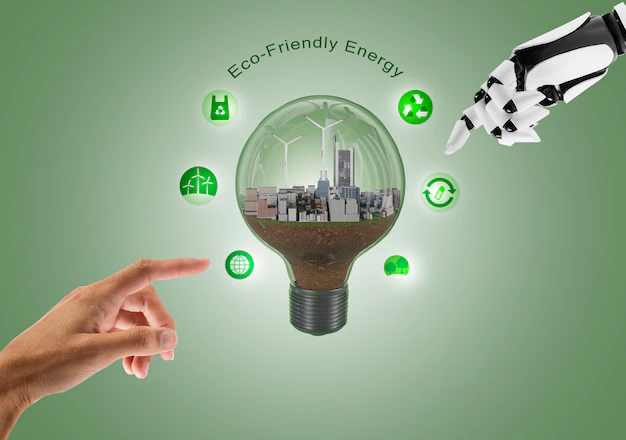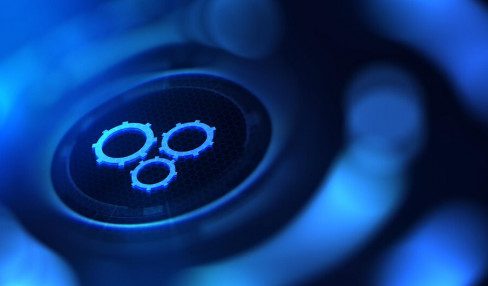Shaping The Future Of Power Transfer In Industry With Advanced Technologies
5 Mins Read
Published on: 28 November 2023
Last Updated on: 09 November 2024

toc impalement
In the ever-evolving landscape of industrial operations, the efficient transfer of power stands as a cornerstone for progress.
Advanced technologies are rapidly reshaping the ways industries manage and transmit power, bringing about unprecedented efficiency, sustainability, and reliability.
This systemic shift heralds a new era where precision and innovation converge to redefine power transfer in the industrial sphere.
In this article, we will explore transformative trends in industrial power transfer. The discussion also includes smart grids, energy harvesting, advanced gearboxes, and AI-driven control systems.
The Rise Of Smart Grids
Smart grids are transforming industrial power distribution, utilizing real-time monitoring to optimize energy flow and reduce downtime. These intelligent systems, incorporating advanced sensors and communication networks, empower industries to dynamically respond to fluctuating demands.
According to SmartGrid.gov, smart grids allow for an increasingly efficient transmission of electrical power. It also provides quicker power restoration in case of disturbances. It also supports reduced operational and management costs for utilities.
Smart grids are shaping a resilient energy infrastructure by enhancing reliability and adaptability. Thus, they ensure a more efficient and responsive industrial ecosystem. In addition to real-time monitoring, smart grids facilitate predictive maintenance through data analytics, minimizing equipment failure and downtime.
The integration of renewable energy sources into these grids further contributes to sustainability, aligning industrial operations with global environmental goals. As industries embrace the rise of smart grids, the result is better efficiency. Yes, there also has been a fundamental shift towards eco-friendly power management.
Wireless Power Transfer
Wireless power transfer is revolutionizing industrial infrastructure by eliminating the need for traditional cables and connectors. Through the use of electromagnetic fields, seamless transmission of power takes place. Ultimately it helps reduce maintenance costs and enhance workplace safety. According to Technavio, the wireless power transfer market is expected to increase by $19,661.65 million between 2023 and 2027.
This innovation not only simplifies power distribution but also enables industries to create more flexible and adaptable operational environments.
The scalability of wireless power transfer makes it ideal for various applications. They range from powering machinery in manufacturing plants to enabling mobile robots.
Industries can now design more dynamic workspaces without the limitations of wired connections, fostering innovation and efficiency. As wireless power transfer becomes a standard in industrial settings, the potential for increased productivity and streamlined operations becomes increasingly evident.
Energy Harvesting Solutions
Energy harvesting solutions are spearheading a shift towards sustainable power generation in industries. By capturing ambient energy from sources like solar and kinetic motion, these solutions offer an eco-friendly alternative to traditional power sources.
This not only reduces dependence on external power but also aligns with global efforts to minimize environmental impact. The integration of energy harvesting technologies into industrial processes contributes to a greener footprint, making operations more environmentally responsible.
As industries increasingly prioritize sustainability, energy harvesting solutions emerge as a key component of future-proofing power systems. By harnessing naturally occurring energy, industries can enhance efficiency while actively participating in the global drive towards a more sustainable and ecologically conscious future.

Advancements In Battery Technology
Advancements in battery technology are reshaping the landscape of energy storage in industrial applications. High-density batteries with extended lifespans and rapid charging capabilities are becoming integral to power systems, ensuring uninterrupted operations in diverse industrial settings.
According to the IEA, lithium metal anode innovations are being worked upon currently. When commercially available, they will offer an even greater energy density.
These innovations not only enhance the resilience of industrial operations but also contribute significantly to the integration of renewable energy sources. The deployment of advanced batteries minimizes the environmental impact of industrial activities by providing a clean and efficient energy storage solution.
As industries transition towards greener practices, the role of battery technology becomes crucial in achieving a sustainable balance between energy demand and supply. With these advancements, industries are poised to embrace a future where energy storage is both reliable and environmentally conscious.
Gearboxes: Precision In Power Transmission
Gearboxes, as precision instruments, play a vital role in optimizing power transmission within industrial machinery. Advances in materials and design techniques have led to the development of highly efficient gear systems, facilitating the seamless transfer of power.
This precision engineering ensures that machinery operates at optimal speeds and torques, enhancing overall performance in industrial processes. Beyond efficiency, modern gearboxes contribute to the longevity of industrial equipment by minimizing wear and tear.
The ability to precisely control speed and torque enables industries to tailor power transmission to specific operational needs, improving overall reliability. As industries increasingly prioritize precision and efficiency, the role of advanced gearboxes becomes critical in the pursuit of streamlined and effective power transmission.
In the world of gearboxes, Power Take-Off (PTO) systems equipped with speed increasers are making significant contributions to industrial efficiency. Cotta notes that these systems efficiently boost output speeds, enhancing the performance of various applications such as agricultural machinery and vehicles.
The PTO gearbox speed increaser ensures that power is transmitted with maximum efficiency, translating into improved productivity and operational effectiveness. The integration of PTO gearbox speed increasers minimizes energy losses and optimizes power usage in diverse industrial settings.
Whether in the agricultural sector or transportation industry, the ability to increase rotational speed enhances the overall effectiveness of machinery. As industries strive for heightened efficiency and productivity, the incorporation of PTO gearbox speed increasers emerges as a strategic choice. This enables them to harness power more effectively and sustainably.
Intelligent Control Systems
Centralized control systems, empowered by artificial intelligence, are orchestrating the seamless flow of power in industries. These intelligent systems optimize energy usage, predict maintenance needs, and adapt to dynamic operational conditions.
By harnessing the capabilities of AI, industries can achieve unprecedented levels of efficiency in power management. This leads to cost savings, reduced environmental impact, and the creation of a smart and responsive industrial ecosystem.
Artificial intelligence in control systems not only enhances efficiency but also provides insights into energy consumption patterns. Predictive algorithms enable proactive maintenance, preventing potential breakdowns and optimizing the lifespan of industrial equipment.
As industries transition towards smart manufacturing, intelligent control systems become integral. They help shape a future where power is not just transmitted but managed with precision and foresight.
Final Word
Smart grids, wireless power transfer, advanced gearboxes, and AI-driven control systems are steering industrial power transfer into an era of unprecedented efficiency. The widespread adoption of these technologies signifies a commitment to not only optimizing operational processes but also fostering environmental responsibility.
Industries are not merely transferring power; they are shaping a future where precision, adaptability, and eco-consciousness converge to redefine the essence of industrial progress. Ultimately, these advancements propel us toward a future where power transfer is a strategic catalyst for a more intelligently managed industrial ecosystem.
Read Also:


















Comments Are Closed For This Article